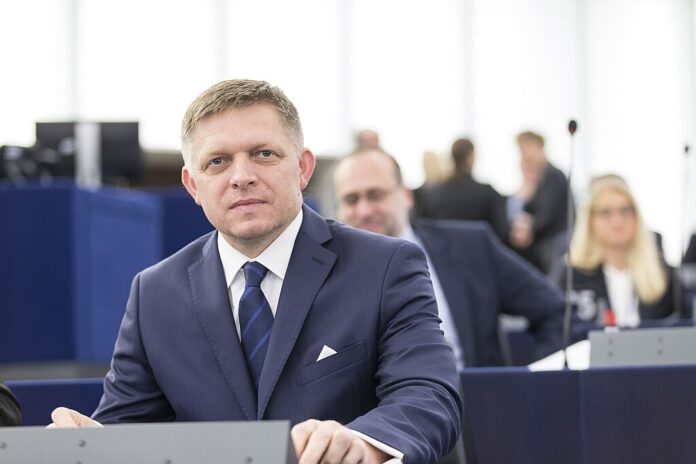Investigation into the shooting of Prime Minister Robert Fico explores possible accomplices; condition remains serious but stable
Slovakia’s Interior Minister, Matus Sutaj Estok, has revealed that investigators are considering whether the attacker who shot Prime Minister Robert Fico may not have acted alone. This new development follows initial reports labelling the suspect as a “lone wolf.” The update comes four days after the assassination attempt on the populist leader, whose condition remains serious but no longer life-threatening.
Deputy Prime Minister Robert Kalinak provided a health update on Fico outside the Banska Bystrica hospital, stating, “The worst that we feared had passed, at least for the time being. We are all a little calmer. When we were saying that we want to get closer to a positive prognosis, then I believe that we are a step closer to that.”
Embed from Getty ImagesThe 59-year-old Prime Minister was shot multiple times in the abdomen while greeting supporters on Wednesday, marking the first major assassination attempt on a European political leader in over two decades. Video footage showed Fico approaching people at barricades to shake hands when a man stepped forward, extended his arm, and fired five rounds before being tackled and arrested.
Minister Estok previously stated that the suspect objected to the government’s Ukraine policy. Fico’s government has halted official military support for Ukraine, adopting a more pro-Russian stance than most European Union members.
The Slovak Specialised Criminal Court has ruled that the suspect, identified by prosecutors as Juraj C., should remain in custody until the trial, charged with attempted murder. Prosecutors argued that he posed a flight risk and might commit further crimes if released. Although the suspect can appeal the order, neither he nor his lawyer has made a public statement.
Little information about the suspect has been disclosed, as prosecutors have instructed police not to release details. Unconfirmed media reports describe him as a 71-year-old former security guard and amateur poet.
Meanwhile, Kalinak, who also serves as Slovakia’s defence minister, mentioned that Fico’s condition is still too severe to consider transferring him to a hospital in the capital. Milan Urbani, deputy director of the Banska Bystrica hospital, added, “The patient is currently out of a life-threatening condition. His condition remains very serious, and he needs a long time to rest to recover. We firmly believe that everything will go in a good direction.”
This assassination attempt highlights the increasing polarization in Slovak politics. Fico’s populist government has faced significant criticism for its pro-Russian stance, which diverges from the broader European Union consensus. The attack underscores the potential for violence in politically charged environments and raises concerns about the stability of the region.
Analysis
The attempted assassination of Slovak Prime Minister Robert Fico underscores significant issues within Slovakia’s political landscape and broader implications for European stability. Politically, this event highlights the intense polarization in Slovak society, exacerbated by divergent views on international alignments, particularly regarding Ukraine. Fico’s pro-Russian stance contrasts sharply with the mainstream European Union approach, causing domestic and international friction.
Economically, Slovakia’s stability is crucial for its economic growth and investor confidence. Political violence can deter foreign investment and disrupt economic activities, potentially leading to economic instability. The tourism sector, an important part of Slovakia’s economy, could also suffer from perceptions of political instability and violence.
Sociologically, the attack reflects deep-seated divisions within Slovak society. The suspect’s reported motivation linked to the government’s Ukraine policy suggests a broader discontent among certain factions. This polarization, if not addressed, could lead to further social unrest and destabilize the social fabric. The involvement of a 71-year-old former security guard indicates that discontent spans across different demographics, not just the youth or politically active groups.
From a local perspective, the incident has immediate implications for public safety and trust in political institutions. The swift action of law enforcement in detaining the suspect may restore some confidence, but the investigation into possible accomplices adds an element of uncertainty. Ensuring transparent and thorough investigations will be key to maintaining public trust.
Gender and minority perspectives should also be considered in analyzing the broader impacts of such political violence. Women and minority groups often face additional vulnerabilities in unstable political climates. Ensuring their protection and addressing their specific needs in security and policy measures is vital for a comprehensive approach to national stability.
The theoretical implications of this event suggest a need for stronger safeguards against political violence and a deeper understanding of the root causes of such acts. Social and political theories emphasize the importance of addressing underlying grievances and fostering inclusive political dialogue to prevent extremism. Policies aimed at reducing political polarization and promoting social cohesion are essential in preventing future incidents.
In conclusion, the assassination attempt on Prime Minister Robert Fico reveals significant challenges for Slovakia’s political stability and social cohesion. Addressing these issues requires comprehensive strategies that encompass political, economic, and social dimensions. Ensuring transparency in the investigation, fostering inclusive political dialogue, and implementing robust security measures are crucial steps towards stabilizing the region and preventing future acts of political violence.
